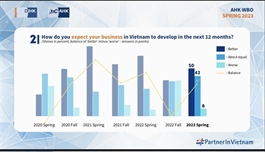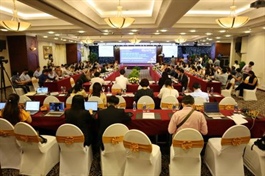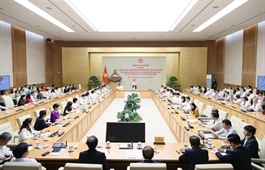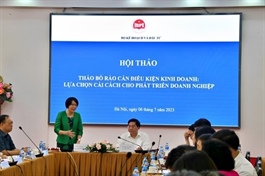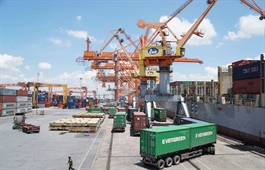European firms’ confidence in Vietnam’s business climate falls slightly: survey
European firms’ confidence in Vietnam’s business climate falls slightly: survey
European business confidence toward the Vietnamese market slipped 4.5 points to the current 43.5 in the second quarter of 2023, reflecting prevailing market conditions, according to the quarterly Business Confidence Index (BCI) conducted by Decision Lab and released on Monday by the European Chamber of Commerce in Vietnam (EuroCham Vietnam).

The BCI serves as a vital tool for understanding the perceptions of European companies and investors in the Vietnamese market.
Some 1,300 European firms, who are members of EuroCham Vietnam, joined the survey.
Compared to the first quarter of the year, five percent more companies thought the macroeconomic conditions would deteriorate, while there was a two-percent increase in the number of business leaders thinking the Vietnamese economy would improve or stabilize.
The index revealed a challenging outlook, with a significant 10-percent expansion in negative responses regarding the current business situation.
This growing sense of caution was further reflected in a six-percent rise in negative sentiment for the third quarter.
However, there is also a glimmer of encouraging news amid many challenges.
The report showed a nine-percent rise in the number of business leaders who assessed their business prospects positively for the third quarter of 2023 compared to their assessment for the second quarter.
Businesses are prudently weighing the landscape, focusing on optimizing revenue and orders.
Additionally, seven percent more companies are planning to carefully manage investments in the upcoming quarter.
Despite the challenges, workforce planning remains stable, reflecting a resolute commitment to maintaining stability regardless of the prevailing conditions.
In the current cautious business climate, respondents highlighted regulatory reforms and the availability of skilled labor as crucial drivers for their companies’ growth.
Regulatory reforms are deemed the primary factor contributing to the growth in the service sector, while the manufacturing sector places significant emphasis on the availability of skilled labor.
“Vietnam’s economy relies heavily on manufacturing and exports, and it has taken a big hit from the tough global situation. The decline in exports and orders has had a major impact on European businesses and the overall business community," said EuroCham Vietnam chairman Gabor Fluit.
The index clearly showed this current gloomy outlook, he added.
“To address these challenges, the Vietnamese government has swiftly taken practical steps,” Fluit remarked.
“However, our members have expressed genuine concerns about power shortages, inadequate infrastructure development, the global minimum tax and personal data protection, and challenges with obtaining visas and work permits; so we have been actively collaborating with the Vietnamese government to find effective solutions.”
Despite the challenges, Vietnam has continued attracting foreign investors, with 48 percent of the respondents expecting a jump in their company’s foreign direct investment (FDI) in the country next quarter.
However, a total of 40 percent of the businesses expressed no plans for elevated FDI, marking a four-percent climb from the previous BCI.
Nevertheless, Vietnam remains firmly positioned among the top five investment destinations for over one-third of the businesses, signifying its enduring appeal.







